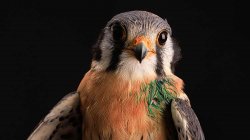What Is Causing the Perplexing Decline of the American Kestrel?
Dr. John Smallwood spoke with ReportWire about the raptor species
Posted in: In the Media, Our Research

Kestrels are cavity nesters that readily inhabit human-made wooden boxes to raise their young, and some return to the same spots year after year. Across the country, from roughly March through August, hundreds of volunteers regularly check thousands of nest boxes on public lands and in backyards to monitor how many chicks successfully hatch and fledge. Data from these studies indicate the sharpest kestrel declines are in the East. “For the birds that show up to nest boxes, their success rates are very high,” says John Smallwood, an associate professor of biology and raptor researcher, of his study area. A single kestrel pair fledges three to four chicks on average. The puzzling problem: “They’re not showing up.”
